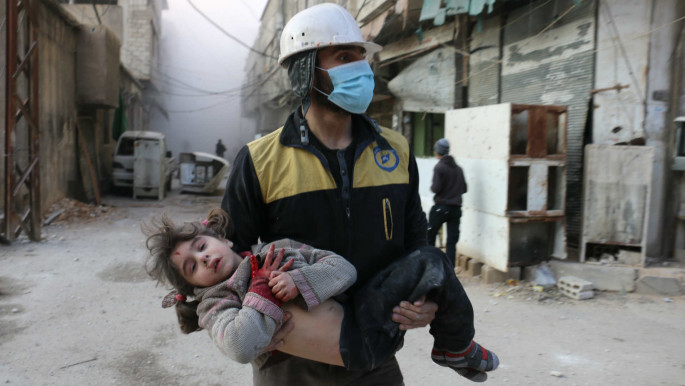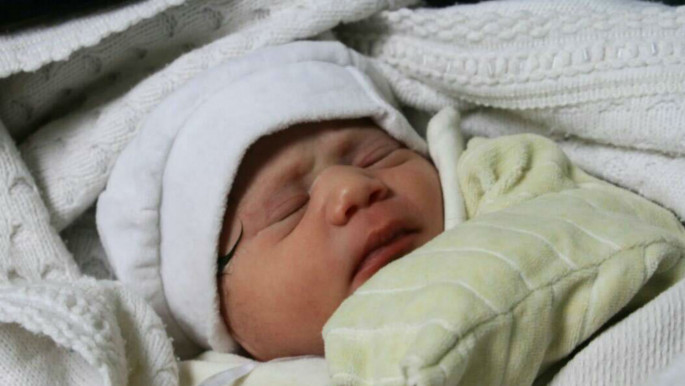The bombing has not stopped: Ghouta after the ceasefire
After the ceasefire imposed by the UN Security Council resolution was delayed from Thursday, February 22, to Saturday, February 24, a further 180 people were killed.
Among them were 26 women and 42 children.
A further 491 people were injured in those few days, according to Ahmed Tarakji, of the Syrian American Medical Society, a Washington DC-based NGO providing support to Syrians.
When the UN Security Council session in New York ended, unanimously approving resolution 2401 calling for a 30 day ceasefire in Syria to enable humanitarian aid delivery, it was 10:34pm in Eastern Ghouta. Civilians there greeted the news with cautious optimism, exhausted from seven days of uninterrupted bombing and shelling.
Yet, as the positive news of the resolution came, the civilian alert system warned an aircraft was approaching: "Expected destination: Eastern Ghouta, eight minutes from now." Explosive barrels rained down on Ghouta.
It was not until midnight that the bombing ceased.
Civilians in Eastern Ghouta may be cut off from the world in terms of food, aid and medical deliveries, but many survivors still have telephone access. In a WhatsApp chat, one resident told The New Arab, after the bombing briefly stopped: "People are happy, but they do not trust the regime and its allies."
Neighbourhoods were reportedly even targeted with internationally prohibited cluster bombs. According to a source on the ground, planes dropped flyers stating that the enclave was surrounded by the army and that civilians should leave the area as a means to guarantee their safety.
"Run to where, if we are besieged?" was the response of one civilian there.
"Now more than 380,000 people [trapped in Ghouta] have time to bury their beloved ones and grieve," said one doctor who wished to remain anonymous. The humanitarian situation is dire, with at least 1,036 patients in need of immediate medical evacuation.
Read more on the latest situation in Eastern Ghouta
Last week, according to the United Nations Office for the Coordination of Humanitarian Affairs, five hospitals were hit by airstrikes, killing three medical staff. This left two hospitals only partially functioning. Each month, these facilities provided an average of 10,000 consultations, 1,200 surgeries, 160 deliveries and 550 trauma treatments.
Private bakeries have also been hit by airstrikes, making it impossible to produce the 30,000-40,000 bags of bread needed daily for the residents under siege.
The total number of documented deaths and injuries reported from the ground since February 19 until the announcement of the ceasefire on the 24th reached 580 people dead and 2,175 injured.
According to the Violations Documentation Center, an independent NGO documenting human rights violations in Syria: "The VDC has documented the destruction of a total of 22 hospitals and [other medical facilities] in Ghouta."
The intense shelling and bombardment has tightly restricted movement in the towns of the enclave, which has had a fundamental impact on access to markets and local supplies.
The New Arab spoke to a second doctor, who also wished to remain anonymous, on Sunday. "There are seven hospitals in Ghouta, but not all of them are still functioning," he said. "I work in one of them but because of the lack of mobility and communication I actually do not know how many of them are still operational."
The doctor has not been able to leave Eastern Ghuta since 2012. According to him, food prices on the black market have more than quadrupled. Some food was coming in from Damascus until the military offensive intensified. "The situation is desperate here, most of the victims are women and children," he said.
 |
|
| Photoblog: Thirty airstrikes later: Devastation and destruction in Ghouta's Arbin |
The opposition on the ground, in his opinion, remains strong. Attempts to reach the same doctor on Monday have not been successful, as communications appear to become increasingly difficult.
Pictures taken on the ground appear to document the use of white phosphorous being used - but this cannot be confirmed. According to more than one doctor The New Arab spoke with there have been no patients treated for wounds related to the use of white phosphorous.
People are trapped in basements for fear of the shelling, without food or water.
The doctor told us of a case he knew: A father had left his shelter, risking his life under a rain of bombs, to find some food for his children. He had left them in the basement where he thought they would be safe. Once he had found someone who would share some bread, he made his way back to his home - and found the entire building had collapsed.
He saw a Civil Defence unit there, searching for signs of life amid the rubble.
Bombing resumed on Sunday, with 81 airstrikes, 82 barrel bombs, 81 mortar blasts and 213 artillery shells hitting Eastern Ghouta, according to the Syrian American Medical Society.
But life goes on, even in the middle of this humanitarian emergency and ongoing breaches of the ceasefire agreement.
This newborn was the first documented baby to have been delivered in Eastern Ghouta after the ceasefire was first declared, a glimmer of hope amid the carnage.
 |
| [Photo courtesy Syrian American Medical Society] |





 Follow the Middle East's top stories in English at The New Arab on Google News
Follow the Middle East's top stories in English at The New Arab on Google News


